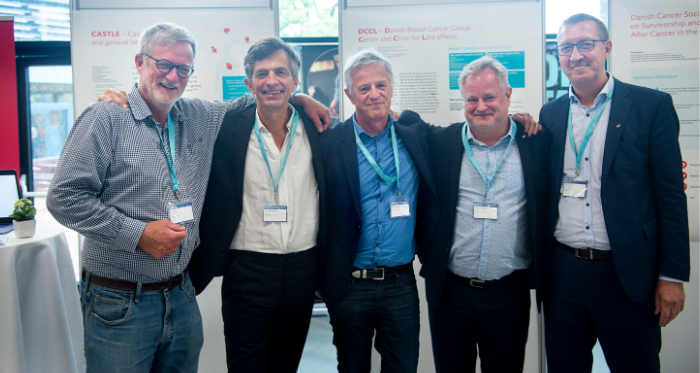
Researchers from the three Danish national late effects centres host the popular science talk about psychical- and psychosocial late effects from cancer. Seen on the picture from the left: Søren Laurberg, Christoffer Johansen, Bobby Zachariae, Peter Christensen, and Peer Christiansen. Photo: Hung Tien Vu/DCCC.
27-05-2020
Late effects from cancer affect diverse patient groups, and treatment of late effects involves a range of interdisciplinary initiatives. Danish Comprehensive Cancer Center and national research centres for late effects bring focus on research in late effects at a popular science talk on August 27th.
Researchers from the three Danish national research centres for late effects will give a popular science talk about psychical- and psychosocial late effects which can occur after cancer and treatment. The livestreamed talk on August 27th offers an insight into current knowledge on the occurrence and treatment of late effects and how to improve patients' quality of life.
The previous DCCC hosted livestreaming of popular science talks on cancer immunotherapy (2018) and radiotherapy (2019) were highly popular among current and former patients, relatives, and professionals from all over Denmark. DCCC continues the tradition of livestreaming presentations in Danish and welcomes questions for speakers from audiences at home.
Patients in need of more help and information about late effects
Studies indicate that half of all cancer patients suffer from late effects such as fatigue, anxiety, pain, and sensory disturbance. Many cancer survivors report that they are missing support from health care professionals on how to cope with the psychical as well as psychological late effects. This topic is covered in the Danish Cancer Society's latest Barometer Survey (2019), which collects information on cancer patients' experiences after their primary treatment, course of follow-up, rehabilitation, and their needs and challenges during and following cancer treatment.
"Many cancer patients feel left behind after their treatment is completed. Close contact with the health care system is maintained throughout the course of treatment, but afterwards, many patients feel ill-equipped to cope with their own late effects. Patients are insecure about what kind of symptoms to beware of – and more than half of all cancer patients with late effects feel that they need more help in handling their late effects", says Pernille Slebsager, Head of Department, Patient- and Relative Support, the Danish Cancer Society.
The Danish patients association of cancer survivors with late effects, called the Late Effects Group, confirms a large number of enquiries about how to cope with late effects. "The counselling hotline in the Late Effects Group often receives questions on symptoms and doubts about who to contact. Many cancer survivors need more help and information on how to ease their late effects", explains Marianne Nord, Chair of the Late Effects Group.
Patients, relatives and health care professionals are invited to join the livestreaming of the popular science talk on late effects on August 27 at 19.00-20.30. Please note that all presentations will be in Danish in consideration of the wider audiences. For more information about the popular science talk visit the danish page
